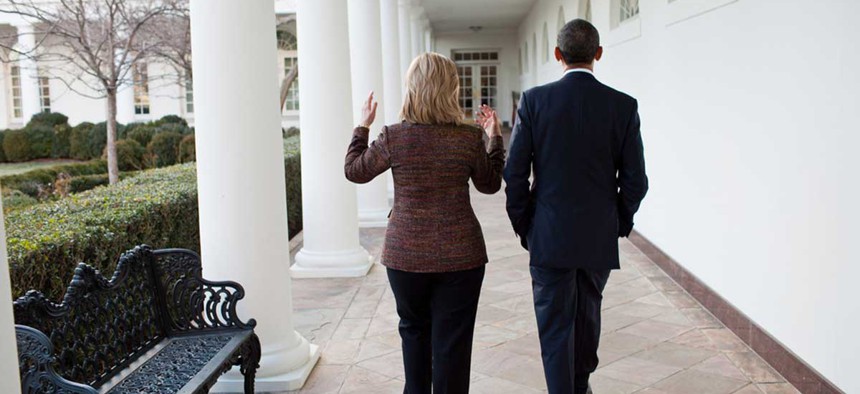
Barack Obama walks along the Colonnade of the White House with Hillary Clinton in 2011. Pete Souza/White House file photo
Democrats’ Biggest Vulnerability In 2016: National Security
Hillary Clinton may suffer from the American public’s unease with President Obama’s performance against terror.
The disconnect between President Obama and the American public on the urgency of the ISIS threat is a problem for his party in 2016, especially for Hillary Clinton.
Democrats are at risk of politically marginalizing themselves on national security in the run-up to the 2016 presidential election, catering to a base that seems disconnected from the growing anxiety that the public feels over the threat from Islamic terrorism. During a month when a horrific terrorist attack killed 130 in Paris and a homegrown, ISIS-inspired attack killed 14 in San Bernardino, California, the Democratic Party’s major focus has been on climate change and gun control.
The signs of a president in denial over the threat of terrorism keep piling up. Obama belatedly addressed the public’s fears in his Oval Office address on Sunday evening, but he offered no new policies to deal with crisis. That it took four days for the president to unequivocally call the San Bernardino attacks “terrorism” underscored how his own instincts are at odds with the American public’s. The decision to give a nationally televised speech without outlining a change of course suggested that administration officials were worried about declining poll numbers and that he was trying to limit the political damage. And for an administration that likes to narrowly tailor Obama’s message to his most enthusiastic supporters, scheduling a prime-time speech for many millions to see (it was his first Oval Office address since 2010) was a concession that he’s not persuading the larger public.
Put simply, the president’s credibility was on the line. Last month in Turkey, Obama testily brushed back repeated questioning from reporters that he underestimated the threat that ISIS posed. Only a day before the ISIS attacks in Paris, Obama confidently proclaimed that the terrorist group was “contained.” In the immediate aftermath of the San Bernardino shooting, Obama told CBS News that “our homeland has never been more protected by more effective intelligence and law-enforcement professionals at every level than they are now.”
When the president’s assurances are being contradicted by events around him, even his own party’s rank-and-file become restive. Democratic voters, mostly supportive of the president, are expressing real concerns about the administration’s handling of terrorism. A 43-percent plurality of Democratic voters believe the U.S. and its allies are “losing” the war against ISIS, according to a Quinnipiac poll conducted just before the San Bernardino attack. A whopping 75 percent of Democrats said it’s likely there will be another major terrorist attack on American soil, and 23 percent disapprove of President Obama’s handling of terrorism.
This is unusual. In the wake of traumatic events, even unpopular presidents tend to find success by calling for national unity. After the Oklahoma City bombings in April 1995, President Clinton’s job approval ratings rose above 50 percent for the first time in nearly a year, according to Gallup’s tracking poll. George W. Bush’s approval reached 90 percent right after the Sept. 11 attacks. These moments were both short-lived, but proved that the public rallies behind a president after frightening tragedies.
But instead of acting as a commander in chief, Obama has become a polarizer in chief. Immediately after the Paris and San Bernardino attacks, both of which provided him an opportunity to reset his antiterrorism policies, he instead chose to find “wedge” issues that he could use to attack Republicans. After he was hounded by the press over downplaying the ISIS threat, he nimbly switched the subject to the GOP’s heartlessness on the question of taking in Syrian refugees, a counterpunch that drew substantial press coverage. In the immediate aftermath of the San Bernardino attacks, he downplayed the terrorist connections and amplified his call for additional gun control. Following the president’s lead, Senate Democrats then tried to put Republicans on the defensive over their fidelity to gun rights by voting to ban people on the no-fly list from purchasing guns. Agree or disagree with those policies, but both were a deliberate distraction from the urgent issue at hand—how to combat ISIS, at home and abroad.
These tactics are consistent with the White House’s view on how Democrats should campaign to win elections: mobilize Obama’s liberal coalition, and highlight the GOP’s most extreme voices to win over persuadable voters. Given Donald Trump’s increasingly inflammatory pronouncements, it’s easy to understand the savvy—and cynical—strategy behind the Democrats’ approach. (Trump’s latest scheme, which calls for the United States to bar Muslims from entering the country, is an example of how polarization can fuel even-more-extreme polarization.)
But in this instance, the problem is that a majority of voters view Obama’s intransigence on ISIS as an extreme position. If the public doesn’t trust the president to keep the country safe, no amount of political jujitsu can hide that fundamental vulnerability. Core Democratic issues such as immigration, gun control, and climate change will be secondary to national security if voters remain insecure heading into 2016.
All this has put Hillary Clinton in a political pickle. She needs to energize the president’s dovish base, which gives her little leeway to give voice to the public’s newfound hawkishness. Ideally, she’d be able to stand lockstep with the president’s policies, touting his leadership in a time of crisis. Instead, she is trying to carefully balance her support for the president while subtly expressing areas of disagreement.
On ABC’s This Week, she said she believed there were “additional” unnamed steps to take against the terrorist group beyond what the administration is doing. AtSunday’s Saban Forum, she said the need for “action is urgent” against ISIS, specifically calling on Silicon Valley firms to do their part to disrupt the terrorist group’s online communications. At the same time, she ruled out deploying American troops to fight the terrorist group and, like Obama, argued that labeling the threat as “radical Islam” would only inflame the problem.
The big question now is how long Clinton will be content to ride Obama’s coattails. Most Democrats are fully committed to the president’s base-first strategy and don’t see any benefit in Clinton distancing herself from a president whom she loyally served for four years. But on an issue that could define the election, she risks being defined by the base—at a time when even some of the president’s former supporters are beginning to question his approach.







